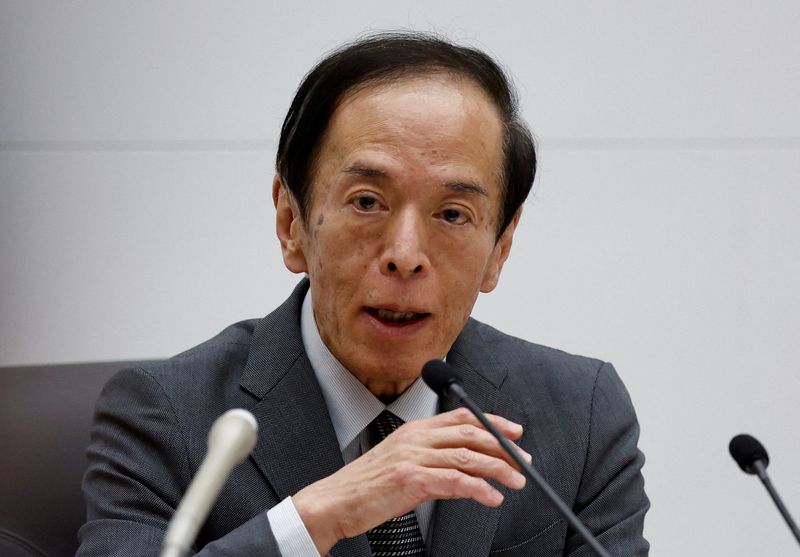By Leika Kihara
TOKYO (Reuters) -Bank of Japan Governor Kazuo Ueda said the central bank will discuss a strategy for exiting ultra-loose monetary policy when sustained achievement of its 2% inflation target approaches.
The fate of the central bank's purchases and holdings of exchange-traded funds (ETF) will also be discussed as and when the BOJ considers an exit from ultra-loose policy, he added.
"We will consider ending yield curve control and negative interest rates if we can expect inflation to stably and sustainably meet our 2% target," Ueda told a semi-annual testimony to parliament on Friday.
"Which part of the stimulus we will terminate, and in what order, would depend on economic, price and financial conditions at the time," Ueda said.
For now, the BOJ must "patiently" maintain ultra-easy policy as it was not yet convinced that Japan will see inflation hit 2% in a sustainable fashion, he added.
"Trend inflation is likely to gradually accelerate toward our 2% inflation target through fiscal 2025. But this needs to be accompanied by a positive wage-inflation cycle," Ueda said.
"Uncertainty on whether Japan will see such positive wage-inflation cycle is high."
With inflation exceeding its 2% target for more than a year, Ueda is under pressure to dismantle the massive stimulus of his predecessor that consists of a bond yield control, negative short-term rate target and massive asset purchases.
Ueda said while the BOJ did not have a specific plan yet on how it could begin selling ETFs, it would do so in a way that is least disruptive to markets and causes minimal losses on the bank's balance sheet.
"If achievement of our price target approaches, we will discuss a strategy and guidelines for exiting ultra-loose policy," including the fate of its ETF holdings, Ueda said.
The BOJ revised up its inflation forecasts last month and projects inflation to stay near 2% this year and next, but attributed the overshoot largely to price hikes aimed at passing on rising raw material costs.
Ueda has stressed the need to keep ultra-loose policy until there is more certainty that wages will keep rising next year, and lead to a more domestic-demand driven rise in inflation.
Consumption has stagnated as wages have yet to increase enough to compensate households for the rising living costs, a point Ueda was repeatedly grilled by lawmakers in parliament.

"It's true the recent cost-push inflation is lowering real income, hurting households and adding burdens to some smaller firms," Ueda said. "It might take some time, but we expect such cost-driven inflationary pressure to subside," he said.
Japan's economy contracted in the July-September quarter, snapping two straight quarters of expansion on soft consumption and exports, complicating the BOJ's efforts to gradually phase out its stimulus.